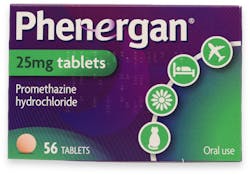Allergy Relief - Crescent Chlorphenamine 4mg 28 Tablets
Allergy Relief - Crescent Chlorphenamine 4mg 28 Tablets
All brands
What 500,000+ customers say about medino:
Get notified when back in stock
Description
Crescent Chlorphenamine 4mg 28 Tablets offers an effective solution for individuals grappling with allergies like hay fever, urticaria (hives), and itching due to various allergic reactions such as food allergies, insect stings, and skin irritants. Suitable for adults and children over the age of twelve, these tablets work by diminishing the effects of histamine in the body, a key trigger of allergic symptoms.
Key features
- Clinically validated to reduce symptoms of hay fever and other allergies.
- Useful for managing conditions like urticaria and itching due to allergic reactions.
- Each tablet contains 4mg of the active ingredient chlorphenamine maleate.
- Additional ingredients include lactose, maize starch, magnesium stearate, pregelatinised starch, quinoline yellow lake (E104), and stearic acid.
- Appropriate for both children over 12 years and adults.
- Simple to administer: just swallow with water.
What symptoms or conditions can be treated with Crescent Chlorphenamine 4mg 28 Tablets?
Crescent Chlorphenamine 4mg 28 Tablets is effective in managing hay fever, urticaria, and itching from various allergic reactions.
What are the benefits of using Crescent Chlorphenamine 4mg 28 Tablets?
Crescent Chlorphenamine 4mg 28 Tablets provides relief from various allergy symptoms, making it a versatile choice for different allergy types.
How does Crescent Chlorphenamine 4mg 28 Tablets work?
Its active ingredient, chlorphenamine maleate, is an antihistamine that counters the effects of histamine, a substance in the body responsible for allergic symptoms.
Can I use Crescent Chlorphenamine 4mg 28 Tablets if I'm pregnant or breastfeeding?
Consult a pharmacist or doctor before using if you are pregnant, might become pregnant, or are breastfeeding.
Ingredients
Each tablet contains 4mg of Chlorphenamine Maleate as the active ingredient.
Also includes Lactose.
Please read the patient information leaflet for an exhaustive list of ingredients
Usage and Instructions
Adults and children aged 12 years and over:
Take one tablet every 4 to 6 hours.
Warnings
Avoid drinking alcohol with this medicine.
Do not drive or operate machinery if these tablets make you feel drowsy or dizzy.
If you have been told by your doctor that you have an intolerance to some sugars, contact your doctor before taking Piriton Allergy Tablets.
Do not take Antihistamine and Allergy Relief 4mg if:
- You have ever had an allergic reaction to antihistamines or to any of the ingredients.
- You have taken monoamine oxidase inhibitors (MAOIs) prescribed for depression in the last two weeks.
- You are taking other medicines containing other antihistamines, including products for the relief of colds and coughs.
Talk to you doctor or pharmacist before taking Antihistamine and Allergy Relief 4mg if:
- You have very high blood pressure, heart disease, epilepsy, glaucoma, enlarged prostate, liver disease, bronchitis, asthma or bronchiectasis.
- You are pregnant or breastfeeding.
- If you are taking any prescribed medicines; particularly phenytoin (for epilepsy) or medicines for anxiety or to help you sleep.
Side Effects
The following are some of the side effects that are known to be associated with chlorphenamine. Just because a side effect is stated here, it doesn't mean that all people using Piriton will experience that or any side effect.
Very common (affect more than 1 in 10 people)
- Sleepiness or sedation.
- Common (affect between 1 in 10 and 1 in 100 people)
- Blurred vision.
- Dry mouth.
- Feeling sick.
- Difficulty concentrating.
- Problems with coordination.
- Dizziness.
- Headache.
- Fatigue.
Talk to your doctor, nurse or pharmacist if you want any more information about the possible side effects of Piriton.







